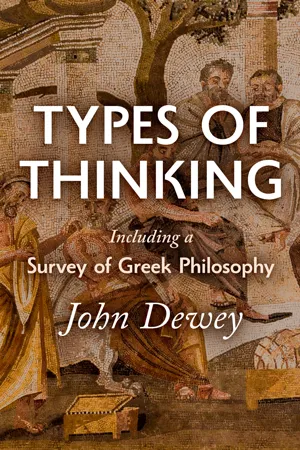
- 239 pages
- English
- ePUB (mobile friendly)
- Available on iOS & Android
Types of Thinking Including a Survey of Greek Philosophy
About this book
A lost series of lectures on the history of philosophy, first delivered in China, now available in English for the first time.
This volume reconstructs a series of lectures delivered by John Dewey during his historic trip to China. Though Dewey's original notes were lost, Prof. Robert W. Clopton and Dr. Tsuin-Chen Ou were able to translate his works as they appeared in Chinese newspapers.
Beyond their historical significance, these lectures show Dewey at the height of his power, discussing and criticizing various schools of philosophy. This includes a brief but comprehensive account of Greek philosophy from the pre-Socratics through Aristotle. Dewey also discusses his own experimental thinking, presenting his position in systematic form for the first time.
"The most complete presentation of Dewey's theory of the development of philosophy, in prose simpler and clearer than he himself ever provided . . . Types of Thinking deserves a place in every subject collection." — Library JournalFrequently asked questions
- Essential is ideal for learners and professionals who enjoy exploring a wide range of subjects. Access the Essential Library with 800,000+ trusted titles and best-sellers across business, personal growth, and the humanities. Includes unlimited reading time and Standard Read Aloud voice.
- Complete: Perfect for advanced learners and researchers needing full, unrestricted access. Unlock 1.4M+ books across hundreds of subjects, including academic and specialized titles. The Complete Plan also includes advanced features like Premium Read Aloud and Research Assistant.
Please note we cannot support devices running on iOS 13 and Android 7 or earlier. Learn more about using the app.
Information
Table of contents
- Cover
- Title Page
- Contents
- Editor’s Introduction to Types of Thinking
- Notes
- Aristotle’s Concept of Species
- Characteristics of Aristotle’s Thought
- Descartes—Extension and Motion
- Characteristics of Descartes’ Though
- John Locke—Sensation and Reflection
- Characteristics of Locke’s Thought
- Experimentalism, Answer to the Conflict between Empiricism and Rationalism
- Characteristics of Experimentalist Thought
- William James
- Henri Bergson
- Bertrand Russell
- Editor’s Introduction to A Survey of Greek Philosophy
- Notes
- The Origins of Philosophy
- Early Philosophical Problems
- The Search for a Universal Principle
- Being and Becoming
- Facts and Theories
- The Sophists
- Skepticism and Logic
- Socrates
- Socrates’Postulates
- Socrates’ Logic
- The Platonic “Real”
- The Platonic “Idea”
- Plato’s Epistemology
- Plato’s Politics
- From Plato to Aristotle
- Aristotle’s “Potentiality” and “Actuality”
- Aristotle’s “Individual” and “Species”
- Aristotle in the Modern World
- Copyright